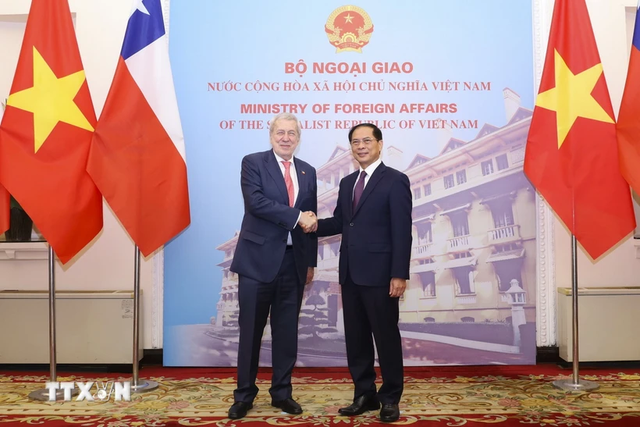Foreign Minister holds talks with Chilean counterpart
VGP - Minister of Foreign Affairs Bui Thanh Son on August 26 held talks with his Chilean counterpart Alberto Van Klaveren who is on an official visit to Viet Nam from August 25 - 27.

Minister of Foreign Affairs Bui Thanh Son (R) welcomed Chilean Foreign Minister Alberto Van Klaveren. Photo: VNA
At the talks, the two ministers informed each other about the situation in each country, discussed directions and measures to strengthen the Viet Nam - Chile comprehensive partnership, and regional and international issues of mutual concern.
Bui affirmed that Viet Nam attaches importance to the traditional friendship with Chile, the first country in South America to establish diplomatic ties with Viet Nam on March 25, 1971.
He expressed his delight at the development of the comprehensive partnership, with the two-way trade exceeding US$2 billion. Chile continues to be Viet Nam's 4th largest trading partner in Latin America, and Viet Nam remains Chile's biggest trading partner in ASEAN.
Viet Nam wishes to deepen relations with Chile in the fields of politics-diplomacy, economics-trade-investment, culture, education, science-technology, security and people-to-people exchange and backs Chile's steps to strengthen ties with ASEAN and the East Asia-Pacific region, emphasized Bui.
For his part, Minister Alberto Van Klaveren expressed his pleasure in returning to Viet Nam as Foreign Minister of Chile.
He affirmed that the Chilean Government wishes to strengthen relations with Viet Nam in its general policy towards the Asia-Pacific region, especially when Viet Nam and Chile are celebrating the 10th anniversary of implementing the bilateral Free Trade Agreement (2014-2024).
Both countries recently became members of the Comprehensive and Progressive Agreement for Trans-Pacific Partnership (CPTPP).
Chile wants to coordinate with Viet Nam to beef up relations between the Pacific Alliance, which consists of Chile, Mexico, Colombia, Peru, and ASEAN.
The two sides discussed and agreed on several measures to further deepen the relationship between the two countries in the coming time, through coordinating to arrange and prepare for high-level visits, effectively promoting the mechanisms of political consultation and the Viet Nam-Chile free trade council, working together to remove obstacles in bilateral relations and facilitating market access for products of both sides.
They reviewed and agreed to promote and negotiate several trade, customs, agriculture, defence, security and law enforcement cooperation agreements.
The two ministers agreed to maintain coordination and mutual support at international organizations and multilateral forums, especially at the United Nations.
Discussing international and regional shared concerns, they concurred that international disputes should be settled by peaceful measures on the basis of respect for international law, contributing to peace, stability, cooperation and development in the two regions and the world./.
